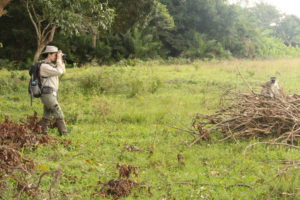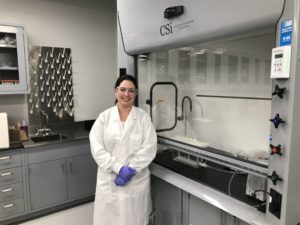Author: Carli Gardner
Dr. Valérie Schoof, researcher and associate professor at York University’s Glendon College, has been awarded a prestigious York Research Chair and a Petro-Canada Young Innovator Award. The awards recognize Schoof as a young and emerging scholar in the field of primate biology whose innovative approaches to research contribute significantly to the training environment of the university and to society at large.
The York Research Chair (YRC) recognizes Schoof for her outstanding research contributions in the field of primate biology with the official title of York Research Chair in Primate Behavioural Endocrinology. As an emerging research leader within 15 years of her first academic appointment, Schoof has been awarded a Tier II YRC. The York Research Chair program is envisioned as York University’s internal counterpart to the national Canada Research Chairs (CRC) program and recognizes outstanding researchers at York.
“Glendon is very pleased with the award of our faculty’s first York Research Chair and the acknowledgement that it brings to Dr. Schoof’s outstanding research achievements,” notes Associate Principal for Research and Graduate Studies, Professor Colin Coates.
From extensive hands-on research experience running field projects in Uganda, Kenya, and Costa Rica, to a prolific number of publications on a wide range of topics related to primate biology, Schoof’s research accomplishments in both fieldwork and written scholarship have earned her recognition from external funding awards at the Natural Sciences and Engineering Research Council of Canada (NSREC), and other notable institutions such as the National Geographic Society and the Leakey Foundation. To date, Schoof has almost 500 citations of her work reported on Google Scholar, and she has been awarded over $1,00,000 in research funding. Such achievements are true testaments to the high-level impact of Schoof’s research in the immediate field of primatology and in the wider research community of York University.
Schoof’s recognition as an emerging scholar in the field of primate biology has brought her praise by colleagues both in Canada and abroad. Scholars applaud Schoof for her impressive involvement in research throughout all stages of her career (graduate, post-doc, assistant professor), and compliment her in-depth publications on three different primate species in three different locations, for their diversity and impact. Stacey Tecot, associate professor of Anthropology at the University of Arizona, identifies Schoof’s work as “impressive for someone at any stage of their career, but particularly so given the creativity and complexity of the questions she asks, the data she collects, and the analyses that she employs.”
In her research, Schoof integrates the behavioural endocrinology of primates with their ecology and evolution. Schoof aims to understand how individuals respond behaviourally and physiologically to their social and physical environment, and how these responses influence individual survival and reproduction. Schoof’s research focuses primarily on behavioural endocrinology as a tool to better understand how individuals navigate the complexities of competition and cooperation associated with life in social groups, as well as individual-level variation in life-history traits and fitness.
Along with her recently awarded tenure, Schoof’s YRC appointment is a crowning achievement. However, she does not fail to reflect on the path that brought her to this point in her career.
From Schoof’s early training conducting research for an undergraduate honour’s thesis at Queen’s University, to her respective research experiences at the master’s and PhD levels at Tulane University, in Costa Rica, and while seeking respite at McGill University following Hurricane Katrina, Schoof recognizes the impact of mentorship from professors and researchers in the field of primate biology on her career trajectory.
Schoof fondly recalls her past research experience at the undergraduate level in Dr. Robert Montgemerie’s lab as a “formative first peek into research,” and acknowledges the continued influence of this experience on her “desire [not only] to talk to students about research,” but also to “involve students [in research] at the undergraduate and graduate levels.”
Now an associate professor of Biology at Glendon College, Schoof has been deeply involved in many facets of the program’s development. Today, the scholar’s initial experiences in academia continue to inform her teaching philosophy and practice both inside and outside of the classroom. Inside the classroom, Schoof recognizes how privileged she has been and so makes a point to share anecdotes from her extraordinary interactions with wildlife on field sites to engage students in the importance of animal and environmental conservation. Outside of the classroom, Schoof participates as a mentor in Glendon’s Research Apprenticeship Program (RAP), a paid opportunity for top undergraduate students to gain hands-on research experience. In addition to her participation in undergraduate level research, Schoof supervises graduate students and research assistants, and is fortunate to work with outstanding field research teams in both Uganda and Kenya.
Although Schoof encourages students at all levels of their academic career to participate in research activities, she recognizes the institutional barriers (like access to opportunities, financial costs of field travel or volunteering), that oftentimes constrain student participation in research. With a recognition of her position of privilege as a York Research Chair, Schoof expresses her continued commitment to reducing institutional barriers that limit students from conducting research by ensuring that students are always paid for their labour, for example.
Schoof’s thoughtful criticism of institutional inequities extends beyond an awareness of limitations placed on students regarding access to hands-on research opportunities to an acknowledgement of the colonial background of field research in primate biology. Through her ongoing research in primatology, Schoof aims for equity in research not just in Canada, but also the Ugandan and Kenyan communitries where she conducts research.
Schoof’s commitment to decolonizing primate research is evident by her investment in local peoples and communities in Uganda and Kenya. By employing researchers who are native to the areas studied, Schoof aims to create “collaborative connections between Canadian and local researchers” and build capacity in local communities. Through these collaborations, Schoof hopes non-African scientists can co-create research with local communities to engage and empower local scientists, which can lead to bi-directional knowledge sharing to benefit the research and local communities.
As Schoof begins to navigate her new role as the York Research Chair in Primate and Behavioural Endocrinology, she reasserts her commitment to fighting for equity in research and the academe “not just with words, but with actionable results as well.” To start, Schoof recognizes that since “people [in the community’s] livelihoods depend on [her] ability to get research grants,” the YRC will provide funding to “to keep the sites in Uganda and Kenya running for 5 more years.”
The Research and Innovation Office congratulates Dr. Valérie Schoof on her recent award achievements as the York Research Chair in Primate Behavioural Endocrinology and a Petro Canada Young Innovator. The Research and Innovation Office looks forward to future celebrations of her commitment to equity as a changemaker in the university community and beyond. To learn more about Dr. Valérie Schoof and her research goals and accomplishments, watch the video recording of Schoof’s engaging interview with current Principal Dr. Ian Roberge from the “Fireside Chat” series hosted by the Glendon Alumni and Advancement Office.





